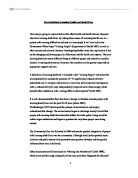What is the role of the family in influencing the health of family members and delivering health care
University: Sheffield Hallam University
Faculty: Faculty of Health and Wellbeing
Module title: Essential of Nursing : Social Science
Assignment title: ‘What is the role of the family in influencing the health of family members and delivering health care’.
Course: BA Hons Adult Nursing
Word count: 2000
‘What is the role of the family in influencing the health of family members and delivering health care’.
Many different people argue over how much influence a family should have in delivering and controlling another family member’s care, there are policies that are put in place so that people can have health care when it is needed. The problem with this is that only so much can be done without other family member's input. To make sure that most areas are covered in whether or not family member's influence delivery of health care, there will be a look at different areas such as family, social policy, psychology and sociology thought out the essay.
There are many different definitions the one most commonly used is from the World Health Organisation (WHO) “Health is a state of complete physical, mental and social well-being and not merely the absence of disease or infirmity.”(1946), this quote really does explain that health is not just one thing, and that there are different areas that need to be looked at when someone is ill. This is taken into nursing as Wright and Leahey (1990) believe that a holism by taking in consideration the patients as a family member but traditionally nursing was an individualistic approach.
As family is an important part of patient care you need to look at what contributes as a family, the reason for this is because over the years what is classed as a family has changed, Macionis and Plummer (2005) descried a family as a “social institution that unites individuals into co- operative groups that over see the bearings and raising of children” but Hanson (2005) states that there is no one definition of what a family is, the reason for this is that family means different things to different types of people. Hanson (2005) also looks at same- sex couples, how levels of same-sex couples are increasing, and how it is not being looked at as, ‘abnormal’. This shows how over the last seventy years families have changed as a traditional British family used to be a married mother and father with the average "2.46" children,(http://www.statistics.gov.uk/cci/nugget.asp?id=762) but this has changed to "1.8" children in 2006 (). Also as divorce has become easier there are many lone parent families, more people having children before marriage and many couples that have no children but class themself’s as a family. Most people class their family as the people that they live with Robb (1998) identifies this by explaining that there are two main family structures “the nuclear and extended”. A nuclear family is classed as two married parents with children; an extended family is your grandparents, aunties and uncles. The typical nuclear family has changed in the U.K. as in 1971 there was 52% of British families with dependent children, where as in 2007 there is only 36% of nuclear families with dependent children(). There are many factors that affect the reason for why there is a decrease in the traditional nuclear family, these are the way in the fact that peoples working conditions have changes as many women seek to have a career, so leave having children to later in their life so there are less births. From this more people are moving away from their home towns to find better employment further afield, as fifty years ago many people would find work closer to their family. The reason for this is because many social trends have changed and family want to support their own family financially, so that they can get better housing, schooling, lifestyle, health care and many other things. Even though these social trends may have changed the concept of the way a family survives is the same and it all has an impact on society. A family as a whole unit has an impact on society, because the way one family acts influences another. All families have a big role in how we lead our life, as from the day we are born the people in our family that bring us up, teach us how we should function and live our lives. This is normally learnt from our parents as they teach us basic skills to be able to function in society. The problem with this is that we could learn things that are not so good for our health such as not having a healthy diet, smoking, drinking, drugs, violence and many other things. A psychologist Albert Bandura (1963) did an experiment that showed that children learn from their parents, this test was called Bobo doll experiment. Albert has some children and he got the parents to act aggressive by hitting and kicking a blow up doll while there children watched. After the children were put with the blow up dolls and the imitated what their parents had done. From this experiment it shows that people learn from other peoples behaviours and their surroundings. It is called Social Learning Theory as people that have the same biological parents but don’t not have the same family unit will behaviour in many different ways.







